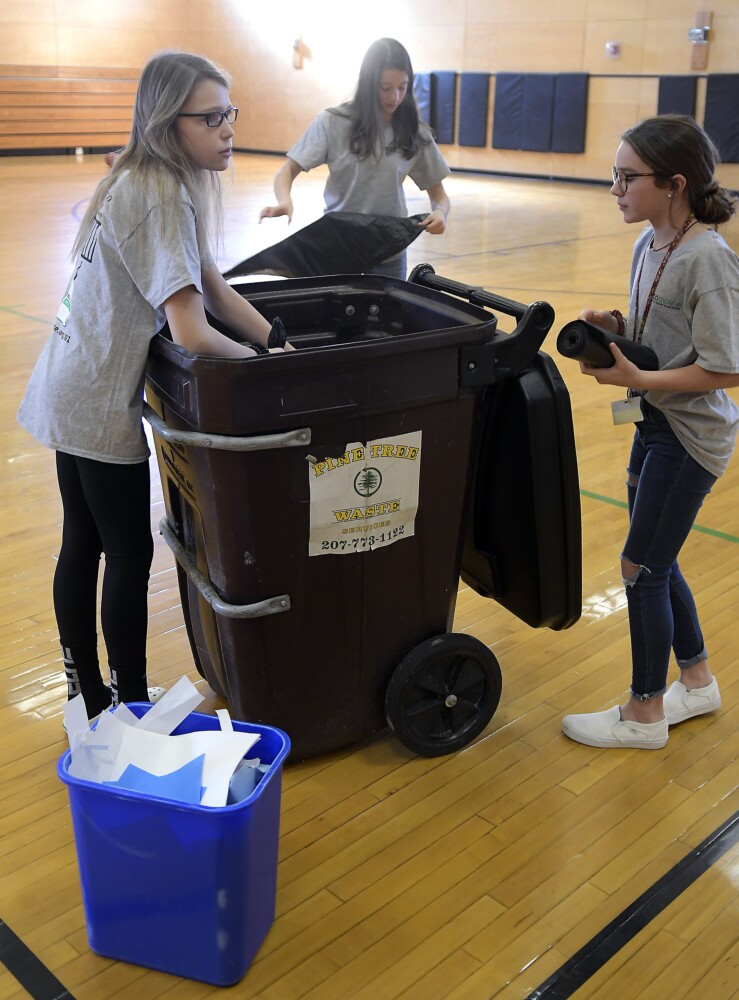When recycling was cut back because of costs, Maranacook Community Middle School students said, no way — even if it meant they would recycle the materials themselves.
“I personally thought that it was a big deal that our school was no longer recycling, based on how much paper just one classroom goes through per day,” said eighth-grader Natalie Mohlar, of Readfield. “I wanted to help change this.”
In 2018-2019, costs of recycling went up and, to cut costs, the Readfield-area school district scaled back from the full recycling, according to Kristen Levesque, the Maranacook Middle School principal.
“A group of students were opposed and really wanted to continue the recycling regardless,” she said. “They weren’t going to take that as an answer.”
Tilden Tinkham of Manchester was another frustrated student and last year she and Mohlar founded the Green Team, with the help of Brayden St. Pierre and Caden Slater, who are now in ninth grade.
“We wondered how we could salvage the old system and started thinking about different solutions,” Tinkham said. “The idea of the Green Team was hatched, and it started to become a weekly activity.”
Members of the Green Team meet weekly to collect the recyclables at the school, and Levesque, who lives in the district, collects that recycled material and brings it to the dump for the students.
Tinkham said it helps the school and noticed that the team’s efforts are contributing to keeping the building cleaner.
“When my friends and I go around the school once a week, there are large bins in each classroom that are either full or close to full,” said Mohlar. “We would just be throwing away two large trash bags full of paper each week if the Green Team didn’t start.”
Their efforts inspired more students to join the recycling force this school year.
“(After we) started showing up to collect recycling,” Tinkham said, “more people started to pay attention.”
The team started this school year with only two members, she said, and now the membership has increased to seven after the team’s “commitment to the cause” was seen.
“So much plastic recently has turned up in places like the ocean and threatened wildlife,” said Tinkham. “I like the idea of recycling and knowing that recyclables are going toward use again and not in a landfill.”
That initiative led to Maranacook Community Middle School being awarded $330 from Portland-based ecomaine, which handed out $25,000 in grants to schools it serves as part of its landfill diversion program this school year. Around a fifth of the granted schools’ programs were student led.
“There is a terrific movement among young people in schools,” said Matt Grondin, the communications manager for ecomaine.

Maranacook Community Middle School student Natalie Mohlar tows a waste bin into the Readfield school’s gym Nov. 25 to recycle paper in teacher Karen Magnusson’s office. Mohlar is a member of the school’s Green Team that recycles at the school. Kennebec Journal photo by Andy Molloy
Maranacook’s funding will put recycle bins in each of the classrooms, including a large central reciprocal, and signage will show what items are recyclable.
Most of the recycle bins in the school were repurposed trash cans, Levesque said, and the Green Team had to sort out trash or non-recyclable items. Having the signage and labeled recycle bins will ease their efforts.
“We are more than just granting funds doing this,” said Grondin. “It spreads beyond, to let the whole school know how recycling can be done.”
Along with providing recycling reciprocals, other schools are using grant funding for composting, reusable cafeteria materials, and outreach materials.
ecomaine sorts out recycled materials, bales them and then finds buyers for the materials, Grondin said. Those buyers, for example, will turn recycled metal cans into new metal cans.
“The cost of recycling is on the rise,” Grondin said, but “the price does cycle.”
With so much paper, its value goes down, but the cost to collect it and haul it goes up, he said. On the other hand, materials like No. 2 plastics have gone up in price.
He added that recycling costs for schools can also be affected by other factors, like the cost to transport the recycled material.
“Recycling was paid for and organized through the general maintenance department for the district,” said Levesque.
Regional School Unit 38 was not able to supply the cost of recycling in the 2017-2018 school year compared to projected costs for 2018-2019 or 2019-2020 had the district continued the same recycling options.
This year, schools applying for grants requested more than $60,000, which was more than ecomaine wrote into its budget.
“Recycling markets have come to the forefront and people are more aware of what their choices with waste lead to,” said Grondin about the increase in applications.
The organization narrowed down the candidate field by weeding out recipients that were not communities it serves. Of the remaining applicants, priority was given to schools with sustainable plans and leadership commitment.
The grants are offered each school year to all schools, including preschools and postsecondary schools.
Send questions/comments to the editors.




Comments are no longer available on this story